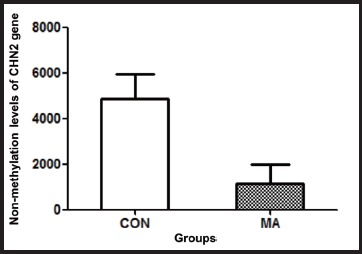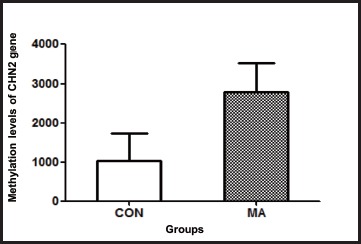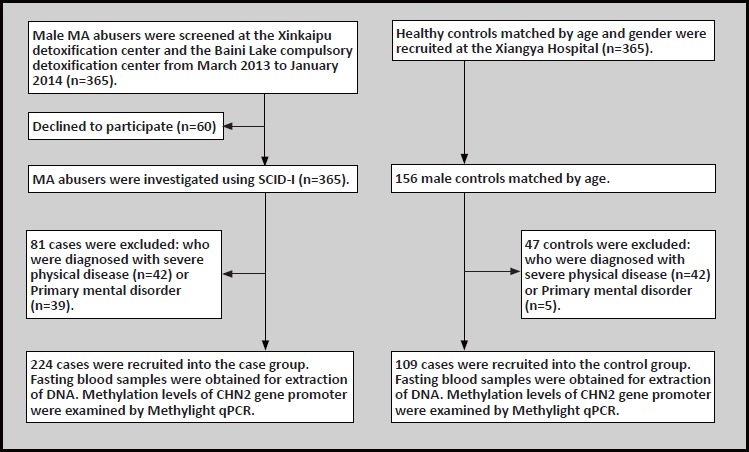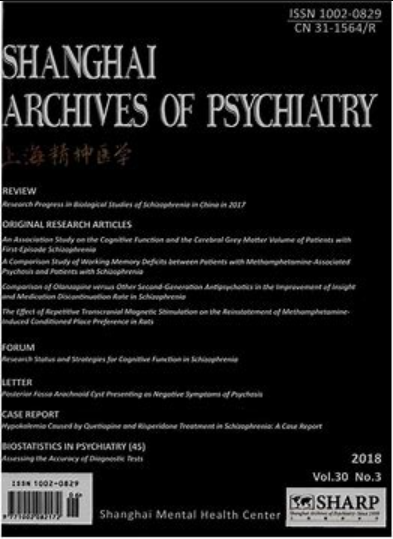CHN2 Promoter Methylation Change May Be Associated With Methamphetamine Dependence.
引用次数: 6
Abstract
Background Methamphetamine (MA) abuse is becoming increasingly serious in China. The mechanism of MA dependence remains unclear. CHN2 gene encodes chimeric protein-2 that regulate axonal pruning via the Rac-GTPase system and play a pivotal role in the formation of nervous circuits. Genetic studies suggest that the polymorphism of the CHN2 gene was related to substance dependence. Aims The aim of this study was to investigate the association between the methylation of CHN2 gene promoter with MA dependence. Methods According to SCID-I (Structured Clinical Interview for DSM-IV Axis I Disorders, SCID-I) used for investigating MA dependence, 224 male MA addicts were recruited into the case group. In addition, 109 healthy men were recruited into the control group. Blood samples were collected with the purpose of detecting the methylation levels of CHN2 gene promoter by methylight qPCR. The association between the methylation of CHN2 gene promoter with MA dependence was analyzed. Results The mean (sd) methylation levels of CHN2 gene promoter in the case group were significantly higher than in the control group, which were 2795.55 (733.19) and 1026.73 (698.73), respectively, showing significant differences between the two groups (t=21.25, p<0.001). Pearson analysis showed no significant correlation between the methylation levels of CHN2 promoter and other factors (the age of initial MA use, the duration of MA use, combination with K powder, tobacco and alcohol). Conclusions The abnormal methylation of CHN2 gene promoter was significantly correlated with MA dependence.



CHN2启动子甲基化变化可能与甲基苯丙胺依赖有关。
背景:甲基苯丙胺滥用在中国日益严重。MA依赖的机制尚不清楚。CHN2基因编码嵌合蛋白2,通过Rac-GTPase系统调控轴突修剪,在神经回路的形成中起关键作用。遗传学研究表明,CHN2基因多态性与药物依赖有关。目的:本研究的目的是探讨CHN2基因启动子甲基化与MA依赖之间的关系。方法:根据用于MA依赖调查的SCID-I (DSM-IV I轴障碍结构化临床访谈,SCID-I),招募男性MA依赖者224人作为病例组。此外,还招募了109名健康男性作为对照组。采集血样,采用甲基光qPCR检测CHN2基因启动子甲基化水平。分析了CHN2基因启动子甲基化与MA依赖性之间的关系。结果:病例组CHN2基因启动子甲基化水平均值(sd)显著高于对照组,分别为2795.55(733.19)和1026.73(698.73),两组差异有统计学意义(t=21.25, p)。结论:CHN2基因启动子甲基化异常与MA依赖显著相关。
本文章由计算机程序翻译,如有差异,请以英文原文为准。
求助全文
约1分钟内获得全文
求助全文
来源期刊
自引率
0.00%
发文量
2341
期刊介绍:
Shanghai archives of psychiatry (bimonthly) was founded in 1959 and is sponsored by Shanghai Mental Health Center. The journal is aimed at mental health workers across the country, including psychiatrists and nurses, clinical psychologists, social workers, and people who are committed to the cause of mental health. It focuses on reporting clinical research results and practical experience in the field of psychiatry, and introduces the latest knowledge in psychiatry and related fields. The columns include monographs, case reports, clinical case discussions, reviews, mental health and law, and debates and discussions.

 求助内容:
求助内容: 应助结果提醒方式:
应助结果提醒方式:


